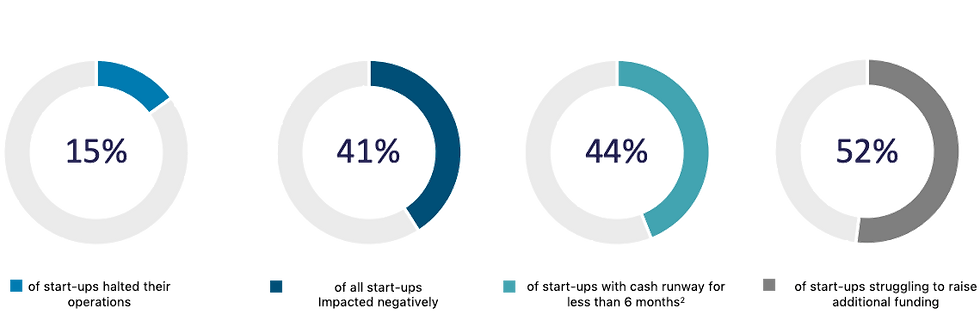Startups may help us revive in a post pandemic world
- Vinay Nair

- Dec 14, 2020
- 4 min read
What if we were told 10 years back that we would have an app whereby we can schedule rides with random strangers going the same direction with their cars?
We would have laughed, marvelled how ‘futuristic’ it sounds!
But now not only is that a reality, but a lot of users also depend on such modes of travel to reach their destinations on a regular basis.
You must remember craving for sweets really bad, when you were a child and either having to go out to the local patisserie to buy it or having to pester your parents to bring you some...
Today’s kids can not only get the savouries when they are craving for it, but they also can get the specific item they want from their favourite bakery, at any time during the working hours of that outlet.
Have startups changed the way we behave?

Startups generally tend to concentrate on the immediate demands of the customers and try to figure out a solution to that, which is user-friendly, easily accessible and can be further developed upon. The startup culture had changed the very way we lead our lives and how we interact with others in our ambit.
While a lot is written and discussed with regards to the twin policies of Make in India and Vocal for Local, the Startup India initiative is often overlooked. Introduced in 2016, this initiative was to complement the Make in India initiative to create a more conducive environment for innovation and development.
India, as of now is home to the 3rd largest startup ecosystem, globally and it is projected that this sector is to see a y-o-y growth of 12-15%.
No one in the world had foreseen the coronavirus pandemic.
No one even imagined that the whole world, for almost a year now would be forced to be indoors at all given opportunities, wear masks, maintain social distance and do everything to not end up in a hospital.
This situation, which is happening globally is quite unprecedented, to say the least, and has turned the world upside down.
All our lives have gone through such monumental changes due to the lockdowns and quarantines, that some of us have even forgotten what it was like before. The global economy has gone into a tailspin, taking with it all the different aspects of it.
A report by TiE Delhi-NCR-Zinnov titled COVID-19 and Antifragility of Indian Startup Ecosystem throws light on,
How entrepreneurs showcased antifragility in the face of challenges
How a few start-ups raced to the top to bag unicorn statuses amidst the pandemic
How the investor sentiments are shifting – for the better – to pre-COVID levels
Why the deal sizes are reverting to pre-COVID levels
How the start-up ecosystem will play a prominent role in India’s economic recovery, and much more
The report also elaborates how these startups are now seeing a trend of gradual recovery from the month of September, and their numbers are returning to the pre-covid success days. Startups in sectors like education, healthcare, and commerce have been able to make the most of this “shift to the digital”, while companies in sectors like travel, hospitality, and mobility, which had born the worst of the crisis are now on a path to recovery.
The report further says that 75% of startups are gradually recovering post lockdown. While 30% of startups have changed their strategies and target customers to explore newer markets in search of alternative revenue streams, 55% of startups are focusing on profitability and reducing their cash burn.
Are startups better equipped to deal with the post-covid economy?

But before we go into how the startups will affect the already collapsing economy, it is imperative to have an idea about how startups in general impact the economy. Startups are engines of growth, oftentimes equipped with advanced technology. While older companies tend to invest in R&D on the tech they already have, startups generally tend to invest in new and cutting edge technology.
Times are so uncertain that one day you might see the news and think that okay, maybe we are on the road to recovery, but the very next day you might have to see how there’s been a severe spike in the overnight additions. The uncertainties related to the vaccine and control of COVID 19 is yet another problematic area. Due to this factor of not knowing what comes next, what is most important for companies to sustain themselves is to be more flexible and agile, and thus have faster decision-making skills. This is easier in startups because their scale is smaller and therefore bureaucratic loopholes are lesser.
Startups also create and open up new markets, which might have previously been beyond the reach of the big companies. They not only generate employment to keep the economy running, but they also change the very landscape and culture of the place where they are established.
The Global Startup Ecosystem Report 2020 (GSER 2020) puts the global startup economy at par with G7 economy, creating nearly $3 trillion in value. It also happens that, given their size, startups and SMEs have been driving long-lasting good jobs.

With the mode of work shifting almost completely to a digital one, and with the rise for the importance and need of freelancers, it seems that startups with smaller and more efficient and dedicated workforces may be what pulls the economies together.




































































































































































































Comments